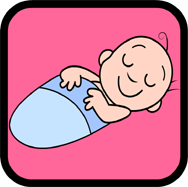
SIDS is typically associated with a period of sleep. As infants need a lot of sleep during the first months of their lives, it is important to ensure that they are sleeping as safely as possible. SIDS is rare during the first month of life. Risk peaks in infants 2-4 months of age and then declines.
Whilst SIDS cannot be completely prevented, there are a few things that parents can do to significantly reduce the chances of this happening.
Sleeping position
The infant should sleep on their back (also known as the supine position) at the beginning of each sleep (unless you are advised otherwise from your GP). It is important that this position is kept for daytime nap as well so consistency as part of their regular sleep routine is important.
There is a significant increase in risk of SIDS where the infant sleeps on their stomach or side. Infants who usually sleep on their back but are placed on the front or side are also at a high risk.
Sofa
Sharing a sofa or armchair with your infant is associated with an extremely high risk of SIDS. This is because it is too easy to fall asleep and the infant can then be trapped between the parent and the back of the sofa or armchair.
Co-sleeping
The safest place for your infant to sleep during their first six months is in their own cot or crib, in your room. Certainly, you should never sleep with your baby in your bed if you have been drinking alcohol, smoking, taking drugs or taking any medication that could make you sleep heavily.
Smoking
Babies exposed to tobacco smoke in utero are four times more likely to die of SIDS. Even after birth, those infants who are exposed to a continually smoky environment are eight times more likely to die than those in a smoke-free home.
Temperature
Infants who get too hot are more at risk of SIDS. The best room temperature for a infant is between 16°C and 20°C – ideally, 18°C. Invest in a room thermometer so you can check that your home, particularly the bedroom, is in the Goldilocks zone (not too hot or too cold). Don't place your baby's cot near a radiator or a heater.
Babies younger than a year should not have duvets/quilts and pillows. A sheet and cellular blankets are perfect because you can add or take away layers to keep them comfortable.
Breastfeeding
Breastfeeding seems to reduce the risk of cot death and breast milk contains all the nutrients and antibodies your baby needs. However, breastfeeding is not always possible, so don't beat yourself up about it.
Dummy
Several studies have shown that giving a baby a dummy when they go to sleep may help reduce the risk of SIDS. It's not entirely clear why a pacifier might help, but it could be because the bulk of the dummy's handle prevents babies suffering from a lack of oxygen if, for example, their faces accidentally become covered by blankets, or it might be because the sucking action helps to improve the development of babies' airways.
I personally don’t like dummies for various reasons. So this is really a parental choice.
As a summary, by following the advice above, you will significantly reduce the risk of SIDS.






